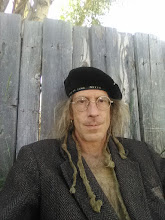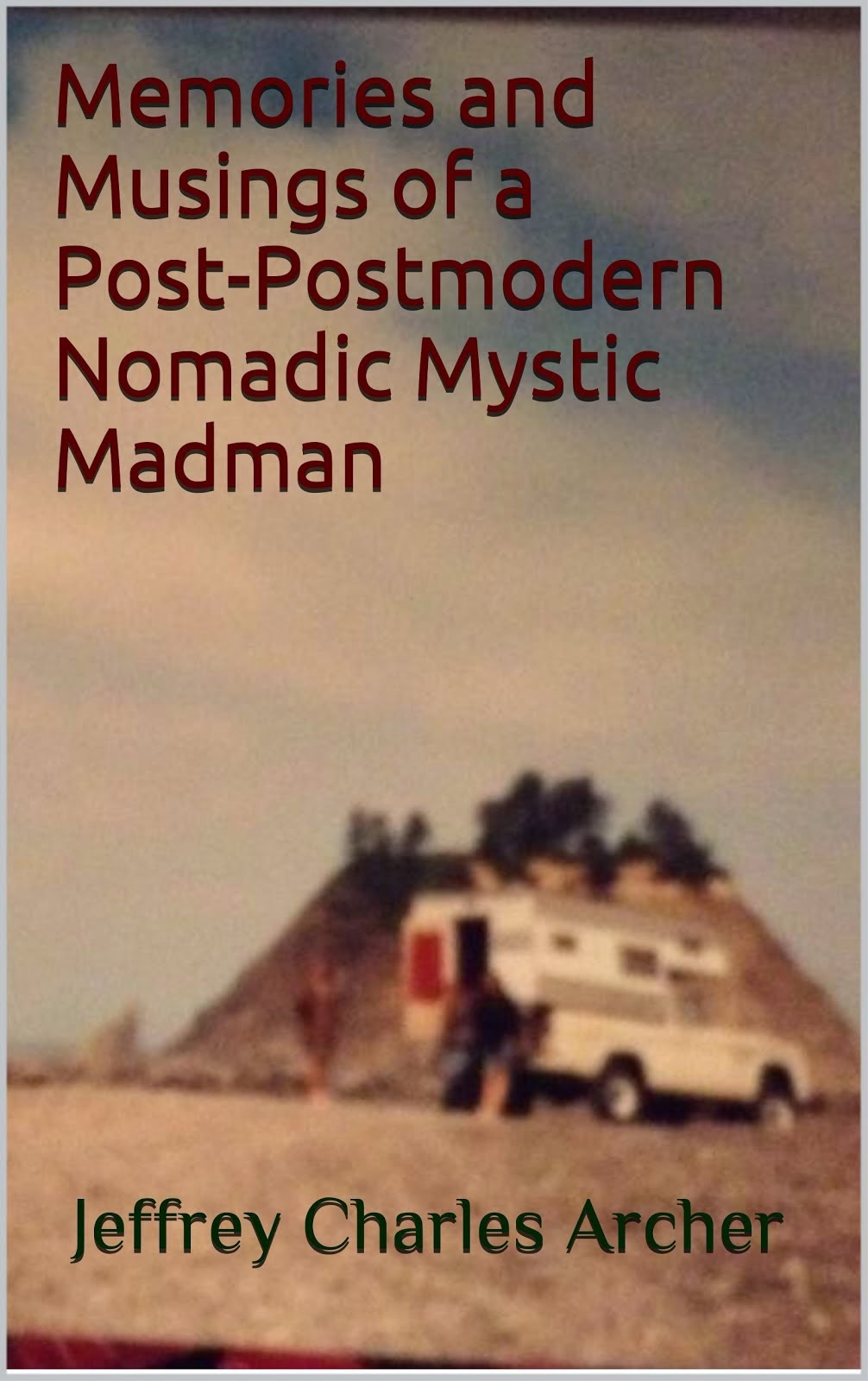A madman's task, this, like an errand
knight, a sorcerer conjuring secrets from the depths of our memories
ancient and sublime, stark and dark truths that do invert assumptions
and paradigmatic presumptions. Upending religious predispositions
and spells spun to lull minds to sleep, disturbing those subtle
taboos surreptitiously existing between the lines of discourse which
somehow prevent us from seeing the obvious stories of history;
challenging assumptions of which end is up and which is down in terms
of the common paradigms proffered; breaking social norms to
unknowingly play out an ancient myth of God in mourning; telling
tales of collusion and subtle twists to the tales of the world's
religions where indeed it is the politics of the gods and stories of
passion and compassion which often leave the truth sounding more like
a puzzle or a riddle or a sci-fi fantasy than “real life.” Only
this is my life and the madman's tasks seem to have fallen upon my
path.
Indeed, for what I have come across in
my studies and searchings has implications would overturn the array
of world mythology and world religion(s) as these stand, and would
thus have startling implications for culture and society as a whole.
The only scarcely hidden story I have uncovered would/will/ought
unravel the myth of “the West” and present a quite inverted
construction and mythic typologies compared to the status quo.
Essentially, the Abrahamic religions represent rather deliberate
seeming inversions or at least twisted versions of the religion of
Abraham's ancestors, which I would assert to be sanAtana dharma or
“Hinduism.” Central to this lila, this rather absurd play, is
the very construction of who and what is “God” and who or what is
to be taken as the opposite of God.
These are facts no one affiliated with
any of the religions involved would reasonably call into question:
-brahman is Sanskrit for the
Universal Divine Being, and atman is
that Divine Soul as is manifest in each.
-Brahma, Vishnu and Shiva are the
Creator, Maintainer and Destroyer expressions of God according to
sanAtana dharma.
-Buddhists generally taut abrahman
and unatma, that
is, they do not believe in God.
-Abraham and Sarah
and Hagar and their tribe originated from Ur of the Chaldese, the
which has been determined to be in far southeast Iraq, rather near
Indus Valley Civilization, which was in fact waning at the time
Abraham is tauted by the Torah/Old Testament to have departed his
homeland in Ur to venture to the west.
-Brahma and
Saraswati are the Creator and His Consort according to Hinduism. The
Ghaggar is a tributary river to the Saraswati River. Abraham and
Sarah and Hagar sound rather like Brahma and Saraswati and Ghaggar,
likely too much for this to be mere coincidence.
-according to
Judaism, “the Righteous” go to a place called Abraham's bosom or
Sheol after they die to await Judgment Day. Sheol
translates to Hades, i.e., “Hell”, in Greek.
-The Hebrews
worship Yahweh.
-The Lord of Death
and Hell in Hinduism is Yama, who was once a mortal who was the first
to attain knowledge of brahman and thus became a Deva (a god) and was
given charge for schooling other mortals not devoted to the Divine
already, as well as charge over the underground Hell supposing any
mortals need such harsh schoolings as are therein proffered.
I first had my
questions regarding the heaven and hell of the Christian religion,
and specifically the place the Hebrews called Sheol or the
Bosom of Abraham, when or perhaps even before I was a Christian
minister. I was not alarmed enough about the potential implications
of that underground place as the holding place of righteous dead Jews
[I thought Hell was the place dead people go that's underground!?!)
to give it a great deal of thought at the time, assuming perhaps that
some theologians must have already worked that problem out at some
point in the long history of the church. I was also given clue to
the importance of the connection between Abraham and Brahma, if
rather as a warning than as a heads up, when I was attending Oklahoma
Baptist University. A religion professor had been giving a lecture
about Abraham and company traveling across southern Asia to settle in
Palestine and the class was about to let out. Dr. Dawson then said,
with rather an odd glint in his eyes,
“Now there may
be those who tell ya' that Abraham has something to do with the Hindu
God Brahma . . . but we know better than that, now don't we?!”
I resigned my
ministry and ceased my affiliation with the Christian church before
my last year in college at OBU largely as I had inferred and
determined that what they taught is essentially untrue, both in terms
of their understanding of language and Divine truth and in terms of
history, though I had no idea to what degree they were in err, if not
covering up the truth of the story to bolster their spin. Again and
most startlingly, it is actually their god that is the Lord of Hell.
According to sanAtana dharma, those who are not otherwise devotees of
brahman in whatever guise, via Shiva or Krishna or Parvati,
etc., then Yama is in charge of their dharma/schooling. As the
Abrahamites left the place and religion of their homeland in Ur and
it seems from the name of their patriarch rejected brahman,
they thus became attached to Yama as their Lord, and they called him
Yahweh. The God of the “polytheistic” Hindus is actually the God
of Abraham's forefathers, brahman, both and neither male and
female, “God” to Abraham's forefathers.
Essentially, one
might see the dispersion of people and specifically religions from
India and from sanAtana dharma as a dialogue that is
essentially the question “to Be or not to Be.” Buddhism tauts
Nirvana, non-Being as they see it, as bliss, and Abrahman, no-God,
as a philosophical hypothesis or supposition around which entire
civilizations were built.
Though not so bold
or forthright with their statement of the question or challenge to
the established notion of brahman (nor perhaps generally much
aware of this aspect of said root to their religions), the Abrahamic
traditions nonetheless have been bound on that task to find means of
interpreting the world without those more ancient and it certainly
seems more abiding understandings of what this all is as expressed in
brahman. It is as if Abraham and crew said, as they departed
from Ur and the world according to sanAtana dharma, “If indeed,
Abrahman (no “God” as we were taught) then what?” As would be
predicted by sanAtana dharma, Yama becomes their Lord and the Deva
(god) responsible for their dharma (schooling), again as alluded to
by the place the Hebrews believe they go after death, the underground
place they call Sheol or the Bosom of Abraham. If viewed from the
broadest perspective, it is as if humanity is playing out the
“question of God” or perhaps “To be or not to be . . .” in
the play of peoples and nations, tribes and myths, experimenting with
how whatever really is the truth will respond to the
presentations proffered. At least as played out in the Abrahamic
religions, the answer proffered to that rejection of brahman is
fitted to within the context of the religion they left behind, and
thus the “Hindu” Lord of Hell, Yama, becomes their God.
I suppose I ought
to note that Muslims obviously do not worship Yahweh (Yama), but in
fact seem to have unconsciously endeavored to return their devotions
to the Gods of their ancient forefathers by worshiping “Allah,” a
name rather starkly near the name Alla, an appellation attributed to
Durga, Consort of Shiva. The all important confession from the
perspective of Islam, is called one of the kalimas, again
rather linguistically nigh another name of Shiva's Wife, Kali Ma
(“Black Mama”). Ummah is the central tenet of Islam translates
as “community.” Uma Himavati is yet another of the names of
Shiva's Consort. Before Mohamed, Arabia was essentially Hindu. By
these evidences and many more, it appears that the cycles of the
three Abrahamic religions rather succinctly follow, else are response
to and bound to within the context of, sanAtana dharma. The
above information is among the many reasons I am a practitioner of
yoga (translates as “yolk” and is root to said English word), a
practitioner of sanAtana dharma, “keeping it together
forever.”
In essence what I
am proposing is a unified perspective of mythology and religion and
culture and history that recognizes that many of the figures of
various mythologies may well be actual conscious entities, else at
least deserve consideration as more than merely imaginary characters.
In order to adequately analyze a mythology's purport, one cannot
approach without some faith in the reality of what you study, it's
verity and that at some level and guise, its gods are real. With
that in mind, what I would propose to do is to in some guise trace
the play of the gods across recorded history. Exemplary of this
would be examining relationship between the Hindu maya/Mahamaya and
the Greek goddess Maya, daughter of Atlas according to said
mythology. The relationship between Lalitha (Hindu tradition) and
Lilith (Judeo-Christian lore) is another example of the tantalizing
possible secrets of the Gods are there to be discovered, as are
traces of Pasupati/Shiva on a cauldron found in Scandinavia, far away
from Indus Valley Civilization as we know of it, thus identifying the
Horned God of Europe with Shiva.
Whether
transmitted by social and cultural means available to the description
of the social scientist or else manifest by esoteric and occulted and
“supernatural” phenomena, these seeming lineages of mythology do
indeed exist beyond mere coincidence. That these nigh cognates and
such so soundly connect seeming disparate mythologies as traces in
the narratives and plays of peoples and cultures, myths and religions
and the play of the Gods/gods, is well enough evinced. Indeed
evidence indicates the possibility of a continuous and contiguous
plot that supersedes individual cultures and religions and
civilizations and the rather narrow purview of most histories writ,
and might discern the subtle discourse that tells of the mind(s) of
God/the gods, whether they be merely us or no.





